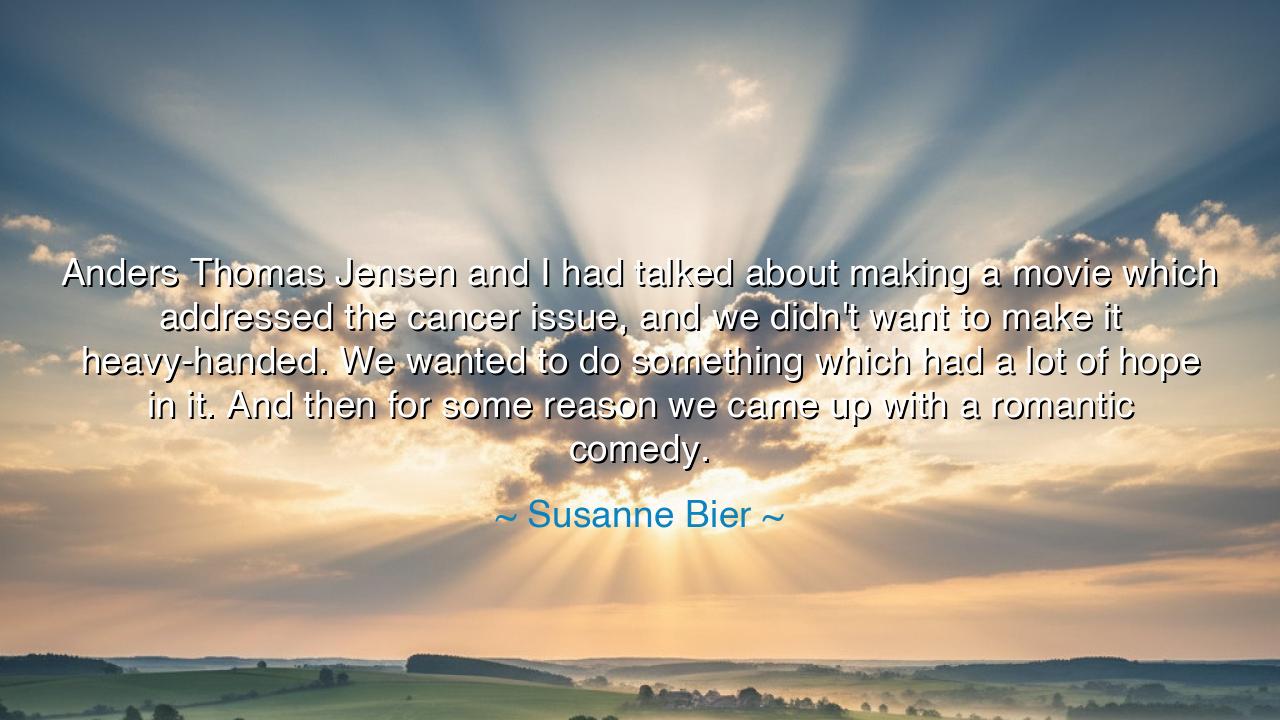
Anders Thomas Jensen and I had talked about making a movie which
Anders Thomas Jensen and I had talked about making a movie which addressed the cancer issue, and we didn't want to make it heavy-handed. We wanted to do something which had a lot of hope in it. And then for some reason we came up with a romantic comedy.






In the words of Susanne Bier, director of human truths and master of weaving sorrow with light, there is uttered a revelation: “Anders Thomas Jensen and I had talked about making a movie which addressed the cancer issue, and we didn’t want to make it heavy-handed. We wanted to do something which had a lot of hope in it. And then for some reason we came up with a romantic comedy.” These words, at once surprising and profound, remind us that even in the shadow of despair, art can choose laughter, tenderness, and love as its weapons against darkness.
The ancients understood this paradox well. The Greeks, who perfected tragedy, also invented comedy, and they often set the two beside each other, reminding us that joy and grief are not enemies but companions. To speak of cancer is to speak of mortality, of fear, of the shadow that stalks every family. But to approach it through romantic comedy is to declare that even in the valley of suffering, the human heart still seeks love, still longs for joy, still deserves the healing power of laughter.
The choice of romantic comedy reveals wisdom: for such stories teach us that love can flourish in the most unlikely places, and that joy is strongest when born from struggle. Just as spring bursts forth more gloriously after the coldest winter, so too does laughter shine brightest when set against sorrow. Bier’s vision is not to deny pain, but to place beside it a counterweight of hope, reminding us that life is not defined by disease, but by the connections we forge and the tenderness we give.
History too provides examples. During the Second World War, when Europe was torn by destruction, Charlie Chaplin released The Great Dictator. Though it mocked tyranny with humor, it also carried within it a plea for humanity, dignity, and peace. It was comedy born from horror, laughter forged in fire, yet it gave strength to those who despaired. In the same spirit, Bier’s decision to approach cancer through romantic comedy is a reminder that art can both acknowledge the darkness and yet lift us above it.
The deeper meaning of her words is that storytelling is not only about accuracy, but about healing. A heavy-handed tale of cancer might leave audiences burdened, hopeless, crushed beneath the weight of reality. But when love and humor are interwoven, the story becomes medicine for the spirit. For laughter loosens fear, and romance reminds us of what is worth fighting for, even in the face of mortality.
The lesson is clear: when faced with darkness—whether in art or in life—do not give yourself wholly to despair. Instead, seek the places where hope can enter. Find the light that softens the shadow. Remember that even in the gravest struggles, love and laughter remain possible, and to hold onto them is not denial but defiance—the most human form of courage.
Therefore, O listener, learn from Bier’s wisdom. When you encounter suffering, do not silence your joy, and do not think it dishonorable to laugh. To embrace hope in the face of sorrow is not weakness, but strength. And if you can weave love into the fabric of hardship, then you will have created a story not only worth telling, but worth living. For even in the midst of affliction, the human heart is made to sing, to laugh, and to love.






AAdministratorAdministrator
Welcome, honored guests. Please leave a comment, we will respond soon